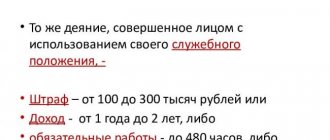1. Violation of the requirements of the currency legislation of the Russian Federation on the crediting of funds in foreign currency or the currency of the Russian Federation in large amounts from one or more non-residents to the accounts of a resident in an authorized bank or to the accounts of a resident in banks located outside the territory of the Russian Federation, in the prescribed manner , due to a resident in accordance with the terms of foreign trade agreements (contracts) for goods transferred to non-residents, work performed for them, services provided to them, information and results of intellectual activity transferred to them, including exclusive rights to them, as well as violation of the requirements of the currency legislation of the Russian Federation on the return to the Russian Federation to the resident’s accounts in an authorized bank or to the resident’s accounts in banks located outside the territory of the Russian Federation, in accordance with the established procedure, of funds in foreign currency or the currency of the Russian Federation in a large amount, paid to one or more non-residents for non-imported territory of the Russian Federation (not received on the territory of the Russian Federation) goods, uncompleted work, unprovided services, untransferred information and results of intellectual activity, including exclusive rights to them, committed by a person subject to administrative punishment for acts provided for in Part 5.2 of Article 15.25 of the Russian Code Federation on Administrative Offences, -
shall be punishable by a fine in the amount of two hundred thousand to five hundred thousand rubles, or in the amount of the wages or other income of the convicted person for a period of one to three years, or by forced labor for a term of up to three years, or by imprisonment for a term of up to three years.
1.1. Lost power. — Federal Law dated April 1, 2020 N 73-FZ.
2. Violation of the requirements of the currency legislation of the Russian Federation on the crediting of funds in foreign currency or the currency of the Russian Federation in large amounts from one or more non-residents to the accounts of a resident in an authorized bank or to the accounts of a resident in banks located outside the territory of the Russian Federation, in the prescribed manner , due to a resident in accordance with the terms of foreign trade agreements (contracts) for goods transferred to non-residents, work performed for them, services provided to them, information and results of intellectual activity transferred to them, including exclusive rights to them, as well as violation of the requirements of the currency legislation of the Russian Federation on the return to the Russian Federation to the resident’s accounts in an authorized bank or to the resident’s accounts in banks located outside the territory of the Russian Federation, in accordance with the established procedure, of funds in foreign currency or the currency of the Russian Federation in a large amount, paid to one or more non-residents for non-imported territory of the Russian Federation (not received on the territory of the Russian Federation) goods, unperformed work, unprovided services, untransferred information and results of intellectual activity, including exclusive rights to them, committed:
a) on an especially large scale;
b) by a group of persons by prior conspiracy or an organized group;
c) using a deliberately forged document;
d) using a legal entity created to commit one or more crimes related to financial transactions and other transactions with funds or other property -
shall be punishable by imprisonment for a term of up to five years with or without a fine in the amount of up to one million rubles or in the amount of the wages or other income of the convicted person for a period of up to five years.
Note. The acts provided for in this article are recognized as committed on a large scale if the amount of uncredited or unreturned funds in foreign currency or the currency of the Russian Federation for one-time or multiple currency transactions carried out within one year exceeds one hundred million rubles, and in an especially large amount - one hundred fifty million rubles.
- Article 192. Violation of the rules for the delivery of precious metals and precious stones to the state
- Article 193.1. Carrying out currency transactions to transfer funds in foreign currency or the currency of the Russian Federation to the accounts of non-residents using forged documents
Types of currency violations
Ordinary citizens, entrepreneurs and legal entities who carry out currency transactions are required to comply with the provisions of the Law “On Currency Regulation and Currency Control” dated December 10, 2003 No. 173 (as amended on July 2, 2021). If they are not observed, violators, depending on the severity of the offense, risk falling under the sanctions of the Code of Administrative Offenses and the Criminal Code of the Russian Federation. Illegal currency transactions may include the following:
- acquisition or sale of foreign currency or checks denominated in foreign currency without the participation of authorized banks;
- conducting foreign exchange transactions in foreign currency not through accounts opened with authorized banks, or bypassing foreign accounts, in cases not provided for by federal currency legislation;
- carrying out operations not provided for by currency legislation with the participation of funds credited to foreign accounts.
Find out what kind of currency transactions there are from the article “Currency transactions: concept, types, classifications” .
In addition, currency violations include:
- failure to submit or submit in violation of deadlines information on the opening/closing (change of details) of foreign accounts of residents who are engaged in business;
- failure to submit, violation of the deadlines (procedure) for submitting reports on currency transactions on accounts in banks (other financial organizations) outside the Russian Federation, including transfers without an account through electronic means of payment of foreign suppliers;
- untimely crediting by residents of funds to accounts in authorized banks from transactions made with non-residents (transfer of goods by non-residents, performance of work, services, etc.);
- untimely return to Russian territory of funds received from a non-resident for a transaction not completed in the Russian Federation.
Violation of currency laws - fines from 2021
The fines imposed for violation of currency legislation are specified in Art. 15.25 Code of Administrative Offenses of the Russian Federation. Prosecution for failure to provide information, documents (or presentation of false information) is also stipulated in Art. 19.4 and 19.7 Code of Administrative Offenses of the Russian Federation. The amount of fines depends on the type of violation, as well as on the category of the offender: simple individual, legal entity, individual entrepreneur.
Typically, fines for individuals are an order of magnitude less than those established for violators - legal entities. In addition, along with the imposition of a fine on a legal entity for carrying out an illegal currency transaction, sanctions are also applied to officials of such an organization who are guilty of committing offenses.
The minimum fine for violators - individuals is 1000 rubles. For legal entities, this amount is more significant: the minimum fine is 50,000 rubles. It is quite common to impose a fine in the amount of ¾ to 1 of the size of such an operation.
For violation of the deadlines for crediting funds within the framework of currency legislation, violators will face sanctions not in a fixed amount, as for carrying out illegal currency transactions, but in the amount of 1/150 of the Central Bank refinancing rate. Deductions are made from the uncredited amount for each day of delay.
Meanwhile, in 2021, gradually introduced relaxations in terms of foreign exchange controls are in effect. For example, residents may no longer return part of their foreign currency earnings (about 30%) to ruble accounts under commodity contracts.
In case of violation of the crediting of proceeds under ruble contracts, a fine of 3-5% is imposed, and for foreign currency contracts - from 5 to 30%. Sanctions are applied at the end of 45 days after the day of obligations to credit funds - this is the date specified in the agreement (clause 9 of Article 15.25 of the Code of Administrative Offenses of the Russian Federation). Liability under foreign trade agreements (contracts) concluded by a resident and a non-resident for small amounts (up to 200 thousand rubles) is not provided for (clause 8 of article 15.25 of the Code of Administrative Offenses of the Russian Federation).
ConsultantPlus experts explained in detail how to make a foreign currency payment and what documents to submit to the bank. If you do not have access to the K+ system, get a trial demo access for free.
What documents are required for currency control and what are its other features, read here.
Commentary to Art. 193 Criminal Code
1. The objective side is described through reference to violations of the requirements of currency legislation on the repatriation of funds (see Articles 19 - 20 of the Federal Law of December 10, 2003 N 173-FZ “On Currency Regulation and Currency Control”). The procedure for implementing the requirements specified in the Law is established by subordinate regulatory legal acts.
A prerequisite for criminal liability is a large amount of unrepatriated funds (note to article).
2. The qualifying feature of the use of a knowingly forged document (clause “c” of Part 2) presupposes, if there are grounds for this, qualification in conjunction with Art. 327 of the Criminal Code (the explanations contained in clauses 6 - 7 of the Resolution of the Plenum of the Supreme Court of the Russian Federation of December 27, 2007 N 51 “On judicial practice in cases of fraud, misappropriation and embezzlement” are applicable).
3. The crime will be considered completed from the moment the deadline established for the return of funds in foreign currency from abroad expires.
4. The special subject of the crime is the head of the organization. Individual entrepreneurs, despite the fact that they have the right to carry out export-import operations, due to the direct instructions of the criminal law, cannot be subjects of this crime.
Which article of the Criminal Code of the Russian Federation contains sanctions for illegal currency transactions?
Even more serious liability for carrying out illegal currency transactions is established by Art. 193, 193.1 of the Criminal Code of the Russian Federation - from large fines to imprisonment.
Under criminal liability, according to Art. 193, includes non-return from abroad of (especially) large sums in foreign currency. Unreturned money is considered to be amounts that, according to the contract, should have been credited to the resident at the authorized bank, but never reached the corresponding current accounts. If the amount of uncredited funds during the year for one-time (repeated) currency transactions exceeds 100 million rubles, it is considered that this is a major violation, and the following punishment is provided:
- a fine of 200 thousand to 500 thousand rubles, but depending on the conditions of the violation, it may entail the seizure of wages (income) for a period of 1 to 3 years, forced labor or an actual prison term of up to 3 years;
- for violations committed by a group of persons by prior conspiracy, the fine framework has been changed from 300 thousand to 500 thousand rubles, but the actual term can reach 4 years.
If the size of illegal currency transactions is equal to or greater than a particularly large amount (that is, more than 150 million rubles), a group of persons was involved in the case, a forged document was present, or an organization was used in the scheme, then the amount of sanctions will be as follows:
- up to 5 years imprisonment, fine up to 1 million rubles. or withdrawal in the same amount of salary (income) for 5 years.
Next article 193.1 of the Criminal Code of the Russian Federation regulates the transfer of foreign currency to the accounts of non-residents. If such a transfer was accompanied by the provision of false data to the bank, then the punishment may be:
- a fine of 200 thousand to 500 thousand rubles, but depending on the conditions of the violation, it may entail the seizure of wages (income) for a period of 1 to 3 years, forced labor or an actual prison term of up to 3 years.
If the violation was committed by a group of persons by agreement, on a large scale or in the scheme, an organization was specially introduced through which all transfers were made:
- up to 5 years imprisonment with a fine of up to 1 million rubles. or withdrawal of the same amount of salary (income) for 5 years.
If the size of the violation is particularly large or a group of persons participated in it:
- from 5 to 10 years imprisonment with a fine of up to 1 million rubles. or withdrawal of the same amount of salary (income) for 5 years.
Sanctions applied under Art. 193.1, refer to amounts (for one-time, repeated transactions throughout the year) that have reached a large amount, more than 9 million rubles, or especially large amounts - more than 45 million rubles.
Judicial practice under Article 193 of the Criminal Code of the Russian Federation
The appeal ruling of the Judicial Collegium for Criminal Cases of the Supreme Court of the Russian Federation dated September 13, 2018 N 33-APU18-12
Referring to the protocol for seizing the phone (vol. 2 pp. 135 - 138), indicates that it does not reflect the individual characteristics of the phone, does not The IMEI is indicated; the protocol also lacks information about the packaging and sealing of the seized phone. At the same time, according to the inspection protocol (vol. 3 pp. 189 - 190), a phone was indeed inspected of the “LG” brand, but in a non-working state and with the corresponding IMEI and with the specified modification - L 80, data on which was not in the seizure protocol . In this regard, the identity of the seized and examined phone is questioned, and K.’s testimony at the court hearing about the similarity of the phone with the stolen one could not be taken into account for the reasons stated. At the same time, he believes that the court actually conducted an identification parade, the rules for which are regulated by Art. 193 of the Criminal Code of the Russian Federation and which were violated.
Appeal ruling of the Judicial Collegium for Criminal Cases of the Supreme Court of the Russian Federation dated January 26, 2017 N 8-APU16-8
Investigative actions were carried out in accordance with the requirements of the Code of Criminal Procedure of the Russian Federation, the drawn up protocols meet the requirements of Part 9 of Art. 193 Code of Criminal Procedure of the Russian Federation. At the same time, the law does not prohibit identification of familiar persons with nicknames about whom the identifying officer previously testified in order to establish their identity, but in accordance with Part 8 of Art. 193 of the Criminal Code of the Russian Federation directly provides for the possibility of identification in conditions that exclude visual observation of the identifier by the identifiable.
Ruling of the Supreme Court of the Russian Federation dated December 14, 2020 N 309-ES19-15238 in case N A60-74988/2018
The courts came to the conclusion about the real nature of the concluded agreement for the assignment of rights of claim, also noting that the satisfaction of claims for recognition of the assignment agreement as invalid without applying the consequences of the invalidity of the imaginary transaction will not lead to a change in the rights and obligations of Pilat LLC in relation to the specified debt, to the emergence the defendant has the right to demand payment of this amount from the foreign counterparty, since the specified organization has been liquidated. This claim is not aimed at restoring civil rights and obligations under contract No. 7/2008 for the purpose of repatriating funds, but at obtaining documents and information necessary to bring the defendant to administrative charges (Part 5 of Article 15.25 of the Code of the Russian Federation on Administrative Offenses) and/or criminal (Article 193 of the Criminal Code of the Russian Federation) liability.
Cassation ruling of the Judicial Collegium for Criminal Cases of the Supreme Court of the Russian Federation dated October 29, 2020 N 38-UD20-8-K1
By the appeal ruling of the judicial panel for criminal cases of the Tula Regional Court dated November 16, 2015, the verdict regarding the conviction of Beshentsev I.V. according to Part 1 of Art. , paragraph “a”, “g”, part 4, art. 228.1 of the Criminal Code of the Russian Federation (crime of January 20, 2015 - preparation for the illegal sale of drugs weighing 2.62 and 2.26 grams) was repealed with the termination of criminal prosecution in this part. The same sentence was changed from the description of the circumstances of what I.V. Beshentsev committed. crime under Part 1 of Art. 174.1 of the Criminal Code of the Russian Federation, the no longer valid indication of the previous version of this article is excluded - “with the exception of crimes provided for in Art. 193, 194, 198, 199, 199.1, 199.2 of the Criminal Code of the Russian Federation"; Beshentsev I.V.’s sentence was commuted. according to Part 1 of Art. , part 5 art. 228.1 of the Criminal Code of the Russian Federation using Part 2 of Art. , part 2 art. Criminal Code of the Russian Federation up to 5 years of imprisonment; on the basis of Part 3 of Art. of the Criminal Code of the Russian Federation for the totality of crimes by partial addition of punishments under paragraphs “a”, “d”, part 4 of Art. 228.1 of the Criminal Code of the Russian Federation, part 3 of Art. , paragraph “a”, “g”, part 4, art. 228.1 of the Criminal Code of the Russian Federation (3 crimes), part 1 of Art. , paragraph “a”, “g”, part 4, art. 228.1 of the Criminal Code of the Russian Federation (7 crimes), part 1 of Art. , part 5 art. 228.1 of the Criminal Code of the Russian Federation, a final punishment of 10 years and 9 months of imprisonment in a high-security correctional colony was imposed. The punishment was determined under Part 1 of Art. 174.1 of the Criminal Code of the Russian Federation in the form of a fine in the amount of 60,000 rubles must be executed independently. The rest of the sentence was left unchanged.
Resolution of the Presidium of the Supreme Court of the Russian Federation dated 06/09/2021 N 146P19
Zatynaiko Vladimir Anatolyevich, ... convicted: July 12, 1993 under Part 3 of Art. 144 of the Criminal Code of the RSFSR to 4 years in prison, April 22, 1994 under Part 2 of Art. 145, part 2 art. 193 of the Criminal Code of the RSFSR using Part 3 of Art. Criminal Code of the RSFSR to 4 years 6 months in prison, released on June 7, 1997 after serving the sentence -
What is the statute of limitations for currency control authorities to hold them accountable?
The statute of limitations for bringing to justice for violation of currency laws in 2021 is 2 years. This time period was set in 2021; until now it did not exceed 1 year.
The increase was required for the reason that documents from customs authorities or banks about violations of the law were often received by Rosfinnadzor, and after its abolition - by the Federal Tax Service after the period during which violators could be held accountable had expired.
The specified two-year statute of limitations applies to prosecution for all currency violations specified in Art. 15.25 Code of Administrative Offenses of the Russian Federation. For example, this provision will affect the lack of transfer to the resident’s account of foreign exchange earnings for goods sold, and untimely reporting for conducting a currency transaction, etc. The statute of limitations in all cases is calculated from the day (date) when the illegal currency transaction was carried out.
Results
The list of violations that may result in prosecution is given in Art. 15.25 Code of Administrative Offenses of the Russian Federation. Carrying out illegal currency transactions entails bringing the violator to administrative or criminal liability. The list of sanctions includes fines and even imprisonment.
What is important to know when working with currency, read in the section “Currency Transactions” .
You can find more complete information on the topic in ConsultantPlus. Free trial access to the system for 2 days.









